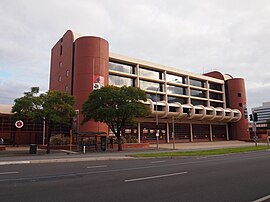Wakefield Street: Difference between revisions
m remove extraneous definite article |
→Location and description: Added Wakefield Hospital |
||
| Line 29: | Line 29: | ||
*[[Our Boys' Institute]] building, now a boutique hotel |
*[[Our Boys' Institute]] building, now a boutique hotel |
||
*[[South Australia Police|SA Police]] city branch |
*[[South Australia Police|SA Police]] city branch |
||
*[[Calvary Wakefield Hospital]], on the north-western corner of the junction with [[Hutt Street, Adelaide|Hutt Street]] |
|||
The temporary [[Adelaide Street Circuit]] racetrack includes a portion of Wakefield Street. Since 1985, a partial road closure has occurred most years to open the racetrack for motorsport events.{{cn|date=July 2019}} |
The temporary [[Adelaide Street Circuit]] racetrack includes a portion of Wakefield Street. Since 1985, a partial road closure has occurred most years to open the racetrack for motorsport events.{{cn|date=July 2019}} |
||
=={{anchor|history}}History== |
=={{anchor|history}}History== |
||
The street was named after [[Daniel Bell Wakefield]], the solicitor who drafted the Act which proclaimed Adelaide. Like his brother [[Edward Gibbon Wakefield]], he was also involved in the South Australia Association in London, but never visited Adelaide.<ref>{{cite web|url=http://www.slsa.sa.gov.au/digitalpubs/placenamesofsouthaustralia/Streets_of_Adelaide_and_Nth_Adelaide.pdf|title=Streets of Adelaide and North Adelaide|publisher=State Library of South Australia|accessdate=21 May 2016}}</ref> |
The street was named after [[Daniel Bell Wakefield]], the solicitor who drafted the Act which proclaimed Adelaide. Like his brother [[Edward Gibbon Wakefield]], he was also involved in the South Australia Association in London, but never visited Adelaide.<ref>{{cite web|url=http://www.slsa.sa.gov.au/digitalpubs/placenamesofsouthaustralia/Streets_of_Adelaide_and_Nth_Adelaide.pdf|title=Streets of Adelaide and North Adelaide|publisher=State Library of South Australia|accessdate=21 May 2016}}</ref> |
||
Revision as of 02:54, 20 July 2019
Wakefield Street | |
|---|---|
 | |
| The Metropolitan Fire Station was built in 1983 | |
| General information | |
| Type | Street |
| Length | 1.2 km (0.7 mi)[1] |
| Opened | 1837 |
| Major junctions | |
| Western end | Victoria Square |
| Pulteney Street, Hutt Street | |
| Eastern end | East Terrace |
Wakefield Street is a main thoroughfare intersecting the centre of the South Australian capital, Adelaide from east to west.
Location and description
It runs in from east to west between East Terrace and Victoria Square, and is one of the three streets (along with Grote Street and King William Street) to run through Victoria Square in the middle of the Adelaide city centre. The same three streets are also the widest streets in the city centre, at 2 chains (130 ft; 40 m) wide (refer to Adelaide city centre#Layout). The western end of Wakefield Street is continued across Victoria Square as Grote Street, which extends to West Terrace. The eastern end of Wakefield Street continues as Wakefield Road across the Adelaide Park Lands to Britannia Roundabout on the City Ring Route, Adelaide. Wakefield Road continues on the eastern side of the roundabout as Kensington Road.
Buildings on Wakefield Street include:
- The Adelaide Metropolitan Fire Service
- St Aloysius College, Adelaide
- St Francis Xavier's Cathedral, Adelaide
- The studios of TV station ADS-10
- Christian Brothers College, Adelaide
- Our Boys' Institute building, now a boutique hotel
- SA Police city branch
- Calvary Wakefield Hospital, on the north-western corner of the junction with Hutt Street
The temporary Adelaide Street Circuit racetrack includes a portion of Wakefield Street. Since 1985, a partial road closure has occurred most years to open the racetrack for motorsport events.[citation needed]
History
The street was named after Daniel Bell Wakefield, the solicitor who drafted the Act which proclaimed Adelaide. Like his brother Edward Gibbon Wakefield, he was also involved in the South Australia Association in London, but never visited Adelaide.[2]
In 1911 the Willard Hall and Willard Guest House were opened by the South Australian branch of the WCTU, named after Frances Willard, United States national president of Woman's Christian Temperance Union (WCTU).[3] The building, previously St Andrew's Presbyterian Church, was situated on the south side of the road, 2.75 yards (2.51 m) west of the east side of Gawler Place. In 1928 an old bell was found in the tower, which was probably the first bell cast in Adelaide and made for the church.[4] A 1939 photograph shows the new art deco additions to the building, and the premises of Frank J. Siebert, Funeral Director, on the left.[5]
The Unitarian Christian Church which once stood opposite Francis Xavier's Cathedral was demolished in 1971 and replaced with a government building known as the "Wakefield Tower".[citation needed]
Junction list
| Location | km[6] | mi | Destinations | Notes | |
|---|---|---|---|---|---|
| Adelaide city centre | 0 | 0.0 | Victoria Square, King William Street | Continues as Grote Street | |
| 0.2 | 0.12 | Gawler Place | |||
| 0.55 | 0.34 | Pulteney Street | |||
| 0.75 | 0.47 | Frome Street | |||
| 1.1 | 0.68 | Hutt Street | |||
| 1.2 | 0.75 | East Terrace | |||
| 1.000 mi = 1.609 km; 1.000 km = 0.621 mi | |||||
See also
References
- ^ "Wakefield Street" (Map). Google Maps.
- ^ "Streets of Adelaide and North Adelaide" (PDF). State Library of South Australia. Retrieved 21 May 2016.
- ^ "Women's Christian Temperance Union". Adelaidia. Retrieved 3 July 2019.
- ^ "Wakefield Street, Adelaide [B 6904]: Photograph". State Library of South Australia. Retrieved 3 July 2019.
- ^ "Wakefield Street, Adelaide [B 7386]: Photograph". State Library of South Australia. Retrieved 3 July 2019.
- ^ "Wakefield Street, Adelaide" (Map). Google Maps. Retrieved 11 December 2016.
